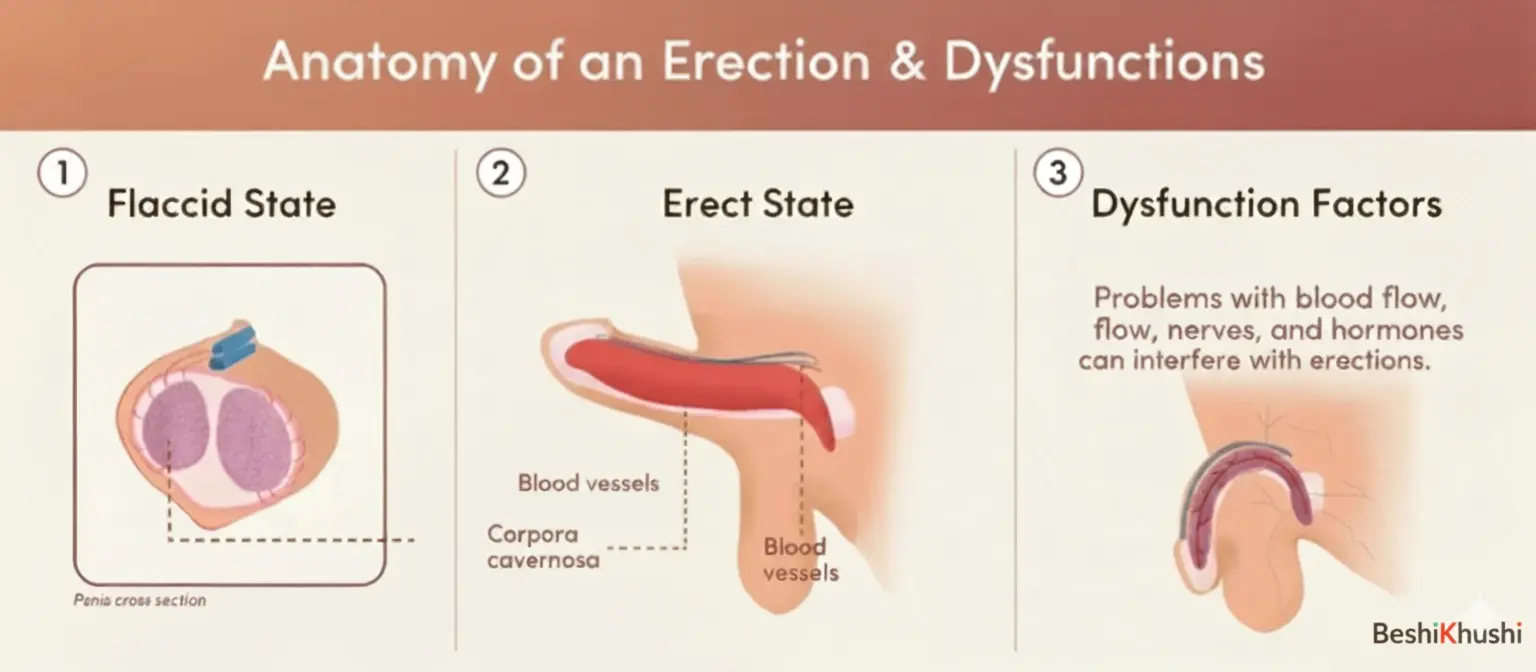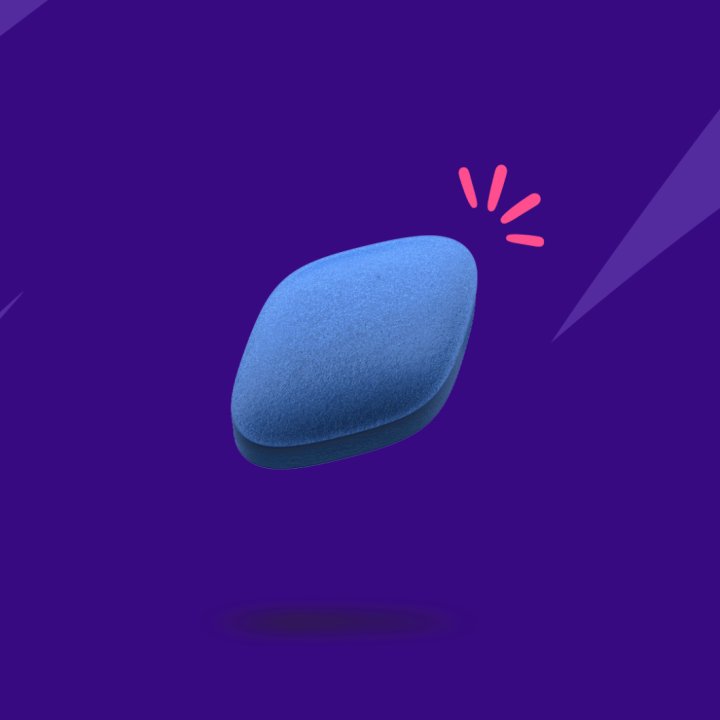
Erectile Dysfunction (ED) in Bangladesh: Symptoms, Causes, Diagnosis & Treatment
Erectile dysfunction (ED) occurs when a man struggles to get or keep an erection firm enough for sex. In Bangladesh, an estimated 5–7 million men face this condition, often linked to diabetes, high blood pressure, heart disease, and rising stress levels, according to the National Institute of Diabetes and Digestive and Kidney Diseases. While occasional erection problems are normal, frequent or persistent ED may signal deeper health, lifestyle, or emotional issues. Understanding what ED is, why it happens, and how it can be treated is the first step toward regaining confidence and intimacy.
What is Erectile Dysfunction
Erectile dysfunction (ED) is a medical condition where a man regularly struggles to get or maintain an erection firm enough for satisfying sexual activity. In Bangladesh, it has become one of the most common men’s health concerns. Unfortunately, many avoid seeking help due to stigma, lack of awareness, or limited access to proper care. The symptoms of erectile dysfunction can vary from mild to severe.
- Failing to achieve an erection
- Erections not firm enough for penetration
- Erections that fade too quickly
- Inconsistent ability to have or maintain erections
These problems can affect intimacy, self-confidence, relationships, and mental health. For many men, ignoring the signs only adds to stress. ED is often the body’s way of signalling an underlying issue, such as diabetes or heart disease. Seeking timely medical advice can make a big difference for both sexual and overall health.
How Erections Work
Inside the penis are two chambers of spongy tissue called the corpora cavernosa and a smaller one called the corpus spongiosum, which surrounds the urethra. In a relaxed state, the penis stays soft. During arousal, blood flows into these chambers, making them expand and firm. A layer called the tunica albuginea traps the blood, helping to maintain the erection until the body signals it is time to return to normal.
There are three types of erections:
- Reflexogenic erections — triggered by physical touch
- Psychogenic erections — triggered by thoughts, arousal, or visual stimulation
- Nocturnal erections — natural erections that occur during sleep
When You Need to See a Doctor for Erectile Dysfunction
Many men occasionally struggle to get or keep an erection. This can happen if you’re tired, stressed by Dhaka’s traffic, or after drinking at a gathering. In such cases, the issue is usually temporary. If the problem becomes frequent, worsens, or causes distress, it’s important to consult a qualified healthcare professional, ideally a urologist. In Bangladesh, ED is often linked to diabetes, high blood pressure, and heart disease. Early evaluation not only protects sexual health but also long-term well-being. A urologist is best equipped to treat ED, though a primary care doctor can begin tests and refer you if needed. For added privacy, many clinics now offer confidential telemedicine consultations. During a visit, your doctor will review your history, discuss habits, and may test blood sugar, cholesterol, or hormones before suggesting treatment—whether medication, counselling, or lifestyle changes.
ED is often classified by cause:
- Vascular: Poor blood flow from diabetes or hypertension
- Hormonal: Low testosterone or thyroid issues
- Neurogenic: Nerve damage after stroke or injury
- Psychogenic: Stress, depression, or relationship problems
Identifying the root cause is essential, since ED is rarely just a sexual problem—it can signal deeper health concerns. Consulting a qualified doctor is the safest way to protect both health and confidence.
Symptoms of Erectile Dysfunction
The main symptoms of erectile dysfunction (ED) are easy to recognize. Many men notice:
- Difficulty getting an erection
- Trouble keeping an erection firm enough for sex
- Erections that are weaker than before or not strong enough for penetration
ED often develops gradually. Early signs are frequently dismissed as tiredness, stress, or aging. But ignoring them can be risky, since ED may signal diabetes, high blood pressure, or heart disease.
Less obvious symptoms can also affect emotional health and relationships, such as:
- Reduced sexual desire or interest in intimacy
- Loss of self-confidence can be one of the symptoms and causes of erectile dysfunction in men.
- Low mood, irritability, or frustration
- Strain in relationships or marriage
- Anxiety about sexual performance
A qualified healthcare provider can assess these symptoms, run tests, and suggest the proper treatment. Being open about changes — even minor ones — is the best way to get practical help.
Causes of Erectile Dysfunction
Usually, erections happen naturally when a man is sexually aroused. The body manages this process automatically, but it’s pretty interesting, involving blood vessels, nerves, hormones, and mental signals working together.

Understanding how erections work also explains why erectile dysfunction can happen for many different reasons. For some men, it may be linked to a clear physical problem, such as poor blood circulation or blocked arteries. For others, emotional factors like stress, anxiety, or depression play a bigger role.
In reality, it’s often not just one cause. Physical and psychological factors can overlap — for example, a man living with heart disease may also feel anxious or under pressure, and together these issues can make erectile problems worse.
Physical Causes of Erectile Dysfunction
Erectile function depends on healthy blood vessels, strong nerve signals, and balanced hormones. When any of these are out of sync, maintaining an erection becomes difficult. Doctors often see ED as an early warning sign of other health problems, sometimes appearing before obvious symptoms.
Conditions that can contribute to ED include:
- Atherosclerosis (hardening or blocked arteries)
- Chronic kidney disease
- Heart disease
- Hypertension (high blood pressure)
- High cholesterol
- Type 2 diabetes
- Low testosterone or hormonal imbalance
- Sleep disorders such as sleep apnea
- Trauma to the genitals, urethra, spinal cord, prostate, bladder, or pelvis
- Surgeries involving the spinal cord, prostate, bladder, or pelvis
- Multiple sclerosis – damages nerve coverings and disrupts erection signals
- Parkinson’s disease
- Peyronie’s disease – scar tissue causing penile curvature and pain
Not every man with these conditions develops ED, but the risk rises when circulation, nerves, or hormones are affected. In many cases, ED is one of the body’s early “red flags” for underlying health issues.
Psychological causes of ED
Emotional well-being is just as important as physical health. Since arousal begins in the brain, issues like stress or depression can interfere with sexual response. Common psychological causes include:
- Anxiety, especially sexual performance anxiety
- Depression or low mood
- Relationship or marital stress
- Low self-esteem
- Feelings of guilt or shame about sex
- Ongoing life stress
There is also some research suggesting that excessive pornography use may contribute to ED in certain cases. Overuse may set unrealistic expectations, reduce satisfaction with real intimacy, and create difficulties with arousal.
Lifestyle Related ED
Daily habits can strongly impact erectile function. Risk factors include:
- Excessive alcohol use
- Smoking
- Being overweight or obese
- Lack of physical activity
- Recreational drug use can also contribute to ED.
The good news is, lifestyle-related ED is often reversible. Quitting smoking, limiting alcohol, exercising regularly, and eating well can make a real difference. Many men find these changes easier with guidance from a doctor, fitness coach. A urology specialist can also recommend the right treatment options for erectile dysfunction.
What are the risk Factors for Erectile Dysfunction in Bangladesh?
ED risk rises when blood flow, nerves, or hormones are affected. In Bangladesh, cardiometabolic issues and daily habits are common drivers. Managing these early can lower ED risk and protect heart health.
- Diabetes (often early-onset): Damages blood vessels and nerves
- High blood pressure & cholesterol: Restrict penile blood flow
- Smoking & smokeless tobacco (zarda/gul): Injure vessels, reduce erection quality
- Excess weight/ Obesity: Lowers testosterone, worsens insulin resistance
- Physical inactivity: Weakens circulation and stamina
- Alcohol misuse: Disrupts hormones and nerve signals
- Poor sleep/sleep apnea: Lowers testosterone, strains the heart
- Stress, anxiety, depression (e.g., long workdays/Dhaka commute): Affect arousal and performance
- Certain medicines (SSRIs, some BP drugs): Can cause ED as a side effect
- Hormonal issues (low testosterone, thyroid disorders): Reduce desire and firmness
- Pelvic/prostate surgery or injury: Damages nerves and vessels
- Age: Risk rises with other illnesses (not inevitable)
If any apply, consult a urologist. Typical tests include HbA1c, lipid profile, testosterone, and thyroid levels to identify and treat the root cause.
Diagnosis of Erectile Dysfunction
To treat erectile dysfunction, the first step is getting the right diagnosis. A healthcare provider will usually start by discussing your medical history, symptoms, and lifestyle. They may also perform a physical exam and ask questions about your sexual health.
In some cases, tests such as blood work, ultrasound scans, or a nocturnal erection test may be recommended to identify underlying causes like diabetes, heart disease, or poor blood flow.
Sharing honest details with your doctor might feel uncomfortable, but it’s completely normal and the more information you provide, the better your chances of getting the right treatment.
How is Erectile Dysfunction Treated
Erectile dysfunction (ED) is a reality for many men, but it doesn’t have to be permanent. Today, there are several effective treatments — from prescription medicines to lifestyle changes and supportive therapies.
The right plan depends on what’s causing the problem and may involve various ED treatments to increase blood flow. For some men, a single approach is enough. For others, a mix of treatments works better, especially when physical, emotional, and lifestyle factors overlap.
- Prescription medications for ED
- Therapy, such as cognitive behavioural therapy or sex therapy, for men facing sexual dysfunction
- Lifestyle changes like a healthier diet, regular exercise, and better sleep
- Medical devices such as vacuum pumps or implants
- Treating underlying conditions like diabetes or high blood pressure
Medications for Erectile Dysfunction
The most commonly prescribed medicines for ED are oral drugs called PDE5 inhibitors (phosphodiesterase type 5 inhibitors). They work by improving blood flow to the penis, making it easier to achieve and maintain an erection with sexual stimulation. While they don’t boost desire, they help the body respond appropriately to arousal.
In Bangladesh (through authorized providers) and worldwide, the main PDE5 inhibitors include:
| Brand Name | Generic Name | Dosages | Onset | Duration |
|---|---|---|---|---|
| Viagra® | Sildenafil | 25 mg, 50 mg, 100 mg | 30–60 mins | 4–6 hrs |
| Cialis® | Tadalafil | 2.5 mg, 5 mg daily OR 5–20 mg as needed | 30–120 mins | Up to 36 hrs |
| Levitra®, Staxyn® | Vardenafil | 2.5–20 mg | ~40 mins | 5–7 hrs |
| Stendra® | Avanafil | 50 mg, 100 mg, 200 mg | 15–30 mins | ~6 hrs |
⚠️ Note: PDE5 inhibitors are safe and effective for most men, but not for those with certain conditions (like severe heart disease, very low blood pressure, or those on nitrate medications). Side effects are possible, so they should only be used under medical supervision.
Other Medical Options
- Alprostadil (Caverject®): An FDA-approved injection or urethral suppository that improves blood flow.
- BiMix®, TriMix®, QuadMix®: Injectable mixes (alprostadil, papaverine, phentolamine, etc.) given under medical supervision.
- Vacuum erection devices (VEDs): Non-invasive pumps that draw blood into the penis.
- Penile implants: A surgical option considered when other treatments fail.
- Testosterone replacement therapy (TRT): Helpful when low testosterone is the underlying cause.
⚠️ Note: Always consult a doctor before starting any of these treatments.
Therapy and Lifestyle Changes
Stress, anxiety, and relationship issues can contribute to ED, that’s why therapy is often part of a treatment plan. Common options include:
- Cognitive behavioural therapy (CBT)
- Sex therapy — offered individually or with a partner to address intimacy concerns
- Stress management counselling
The proper treatment depends on your health and personal needs. Lifestyle changes also make a big difference: staying active, maintaining a healthy weight, eating well, reducing alcohol, quitting smoking, and improving sleep. With proper guidance, most men can find safe, practical solutions that restore both sexual confidence and overall well-being.
ED is common, but it doesn’t define you. With the proper care, men can regain confidence and intimacy. In Bangladesh, BeshiKhushi offers access to safe treatments, supplements, and confidential consultations.
Prevention of Erectile Dysfunction
It may not surprise you that preventing erectile dysfunction (ED) is closely tied to managing common health risks and lifestyle habits. Age is something none of us can control, and while ED isn’t inevitable, the risk increases with conditions like diabetes, high blood pressure, and heart disease. Studies show about 40% of men in their 40s report some degree of ED, rising to nearly 70% in their 70s. But ED isn’t only an “older man’s problem.” Younger men can also be affected. In Bangladesh, stress, long workdays, sedentary routines, and early diabetes are raising risks among men under 40. The good news is many causes are preventable. Practical steps include.
- Managing chronic health conditions
- Quitting smoking
- Limiting alcohol
- Maintaining a healthy weight
- Staying physically active
- Reducing stress
- Getting enough sleep
- Scheduling regular health check-ups
Early action helps protect sexual health, energy, and confidence.
Erectile Dysfunction (ED) in Bangladesh: Frequently Asked Questions
Clear, doctor-reviewed answers to common questions about erectile dysfunction (ED) in Bangladesh — symptoms, causes, diagnosis, and safe treatment options.




